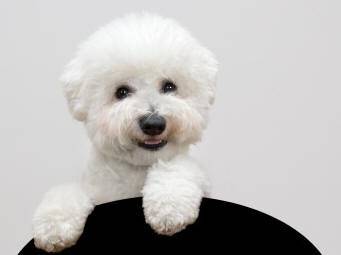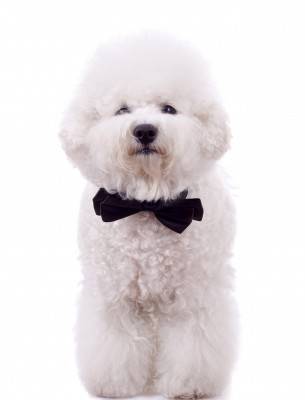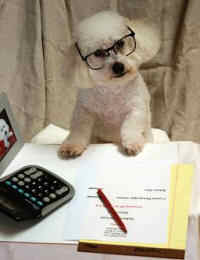All About Bichon Frise Dogs and Puppies
Originally developed in the Mediterranean, the Bichon Frise is a descendant of the Barbet, a variety of Water Spaniel that was common to that area. While he was first called the Barbichon, his name would eventually be shortened to Bichon and, originally, this unique little dog was divided up into four different categories: the Bichon Teneriffe, the Bichon Maltais, the Bichon Bolognais, and the Bichon Havanais. Regardless of what number of names he was known by, he would eventually come to be
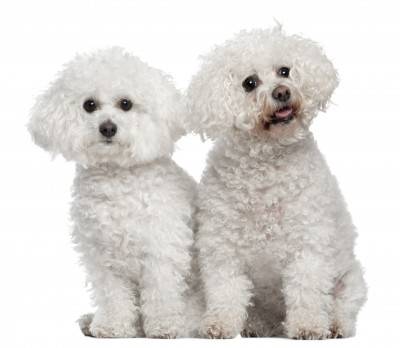
Bichon Frise History
The Bichon Frise are generally very happy and cheerful individuals, and they seem to have a great love of traveling. Quite often, sailors would barter with these little white dogs, using them as trade items as they traveled across the seas and from continent to continent. It is believed that it was the trading practices of the Spanish sailors that first introduced the Bichon Frise to the Canary Islands, but as far back as the early 1300s, Italian sailors claimed to have discovered this unique little island-bred dog and they eagerly reintroduced it back to the Continent. In no time, they became a favorite of the Italian nobility and, amongst those that frequented the courts, the Bichon Frise was often clipped in a fashionable style, resembling a lion.
In addition to their popularity in Italy, the Bichon also remained a favorite of the Spanish Infantas, and the painters of the Spanish school frequently painted the Bichon Frise in many of their works. During the Renaissance, this adorable little white dog also captivated the French, though it wasnt until the court of Henry III, that the Bichon truly gained a place amongst the French nobility. Of course, as court fashion came and went, it wasnt long before the powder puff Bichon was set aside for something else that was new and exciting.
The Bichon Frise would enjoy a brief popularity peak while Napoleon III ruled, but he would soon become known as the common dog and was then left to the peasants, where he ran loose in the streets or performed in local fairs and circuses. Popular amongst the organ grinders from Barbary, this happy-go-lucky white dog enjoyed his place in the spotlight and eagerly learned new tricks that endeared him in the hearts of many. Common dog or not, he was determined to make his mark in the dog world.
In 1933, the Societe Centrale Canine of France adopted an official standard for this fluffy white dog. At this time, they were known as either the Bichon or the Teneriffe, so the president of the International Canine Federation proposed that a single name would be decided, that would identify the traits of this unique little dog and, with that, so he was named the Bichon Frise (Frise making reference to the breeds soft and curly hair).
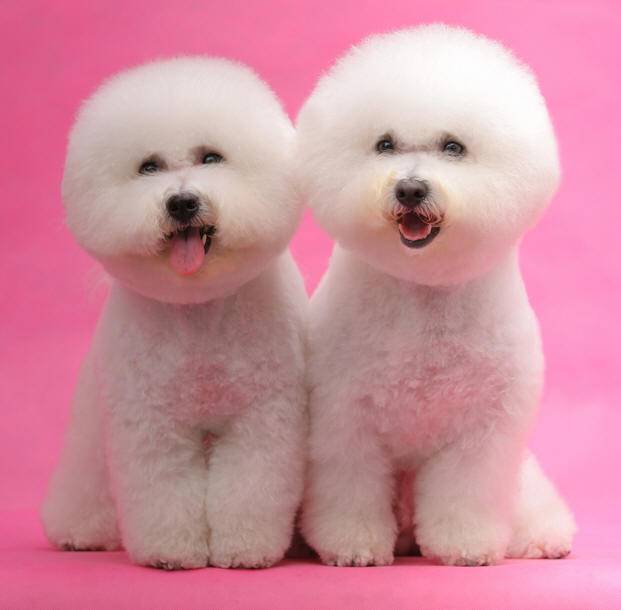
Bichon Frise Appearance
The Bichon Frise stands between 9 and 12 inches at the shoulder and is well known for his incredibly curly, soft coat. With their only variety being white, they are quite often referred to as powder puffs, simply because of their fluffy appearance. Coupled with a plumed tail which is always carried happily draped over his back and very dark, inquisitive eyes, the Bichon seems to radiate exuberance and a willing nature. Very intelligent and usually playful, its little wonder that they are excellent companion animals and a popular house pet.
Bichon Frise Temperament
The Bichon Frise is one of the most engaging, fun and entertaining breeds in existence. This happy, eager to please dog breed makes a wonderful companion for dog lovers of all ages. Great with children, and a loving lap dog for elderly or disabled owners, the Bichon will charm and delight his owners on a daily basis.
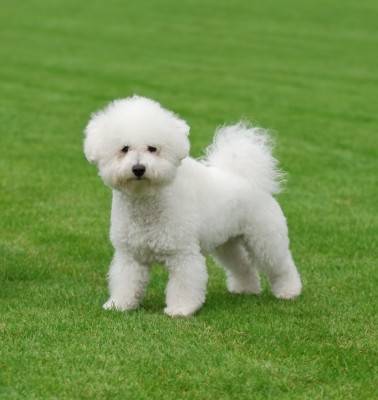
Bichon Frise Exercise Info
Bichons are lively, but don’t need a lot of space or exercise to keep them healthy and happy. For this reason, they are a great choice for apartment life or life with an elderly or disabled dog lover.
Bichon Frise Grooming Info
In contrast to the minimal exercise needs of the Bichon Frise, grooming is entirely another matter. The Bichon boasts a lovely white fluffy single coat that grows long and prospers! Daily brushing and frequent baths are necessary to keep snarls and snags at bay, and a visit to the groomers about 4 times a year is needed, unless the owner is willing to learn the art of using dog clippers.
Bichons have ears that can be prone to yeast infections and mite infestations, but a once-weekly cleansing with an acidifying ear wash will keep these problems from cropping up.
Tooth brushing is an important grooming requirement in the Bichon, which can be prone to dental problems. This is an easy task which should be done on a daily basis.
It’s important to keep your Bichon’s bum area nice and tidy. If the fur around the anus is allowed to grow, it can cause your Bichon a great deal of distress, when fecal matter starts to hang on and go for a ride. (Also known as “poop-hikers” 🙂 Fluffy dogs find this situation highly embarrassing and very frightening, and it’s best to avoid it at all costs by keeping the hair around this area nice and short. You can trim this area yourself with the careful use of a pair of scissors.
Bichon Frise Training Info
Bichon Frise dogs are highly intelligent and learn tricks and other commands very easily. This breed responds best to high praise, delivered often and with gusto.
House training a Bichon can be a bit more trying. This is a breed that is notoriously difficult to housebreak, and has been lovingly referred to by many Bichon Frise owners as a “Pees-On”.
That having been said, Bichons can be housetrained! It takes dedication and consistency from all members of the family, but it can be done.
Many Bichon owners have found housetraining success through the use of the “tether method”. It takes about 48 hours to house-train your Bichon using this method. You simply tether or tie your Bichon to you using a short leash. Whenever your Bichon makes a move to do anything that may result in peeing or pooping, you take them outside immediately.
Come up with a phrase that you will always use when asking your Bichon to do his business. It can be “Do Your Pee”, or “Lets Do It”, or something similar. Each time you take your Bichon out to pee or poop, repeat that phrase using a happy tone of voice. If an when your Bichon complies, immediately heap on the praise. Don’t be shy.. Jumping up and down yelling “WooHoo… Good Dog!” can be very effective. Don’t worry about what neighbors or passers-by think – they don’t have to clean up your house!
You can also keep a supply of small treat tidbits in your pocket, and add a treat to the high praise given to your Bichon when she pees where she should. Be careful though – some dogs start to associate the act with the treat, and will want go often in an attempt to acquire more and more treats. This can be highly annoying at 4 am.
Anyway, keep up your tether training regimen for about 48 hours, and you should have a house-trained Bichon.
One thing to note: If your Bichon has had accidents in your home, be sure to completely clean away any residual stains and or smells using a biological enzymatic cleaner. Nothing tempts a Bichon to have an accident more than the scent of a previous incident.
Despite this somewhat daunting issue, the Bichon Frise is still a delightful dog breed. Most owners find that this breed’s personality and charm greatly outweigh the occasional inconvenience of cleaning up a bit of dog pee.
Bichon Frise Health Info
Bichons are a healthy, long lived breed of dog that have relatively few health problems, especially compared to other purebred dog breeds. The breeder from which you choose to purchase your Bichon puppy will be instrumental in the health of your new companion. As with any popular purebred breed of dog, there are reputable breeders who breed for the health, wellbeing and longevity of their dogs and puppies, and there are other sources of purebred puppies that can be a very bad choice.
Make sure you acquire your Bichon puppy from a responsible breeder who health screens and breeds only the best to the best, to help ensure that your Bichon lives a long, happy and healthy life with you and your family.
Health problems that can occur in the Bichon Frise dog breed are:
Skin Allergies
Dental Problems (Gingivitis and Early Tooth Loss)
Both of these problems can be easily prevented or alleviated with regular grooming and proper care.
Other health conditions that rarely occur in the Bichon Frise are:
*Bladder infections and stones
*Orthopedic (patellar luxation, Legg-Calve Perthes, disk degeneration)
*Eye diseases (cataracts, glaucoma, dry eye)
*Cardiac Problems
*Cancers (no one type predominant)
*Metabolic diseases (Cushings, diabetes, pancreatic)
*Disease of the liver and spleen
*Ear (infections, deafness)
A responsible breeder will be well educated about conditions that may affect the Bichon and will health screen her dogs and follow a carefully selective breeding program. Choose your breeder carefully!
Bichon Frise Right Breed Info
The Bichon is a wonderful companion animal and is generally happy and friendly. Rarely snappish, they are a favorite amongst the elderly, as well as with those who are allergic to most dogs, due to the fact that they dont shed like many breeds. Bichon also love children and tend to get along, very well, with cats and other dogs as well.
There are three main concerns to keep in mind, if you are thinking about getting a Bichon Frise puppy. The first of these is the amount of time that you have to spend with your puppy; Bichons are companion animals and they enjoy company. While they can be taught to stay in a crate happily, they dislike being left alone for long periods of time, and they do love to travel. The second and third concerns have to be the safety issues within your home – do you have larger, more aggressive dogs? If you do, you may want to have them meet on a more neutral territory and make sure that they get along.
The last and one of the most important concerns has to deal with children. While the Bichon Frise is an excellent family dog, and is very good with children, be wary of getting any puppy until your child is over the age of 5 years. Puppies are very fragile creatures and can easily break bones if they are dropped, kicked, or fallen on. Be sure to protect your baby Bichon, just as you protect your own baby.
For more information on the Bichon Frise, or to examine whether or not a Bichon Frise will do well in your home, contact your veterinarian or local breeders and be sure to ask lots of questions. If you decide on one of these adorable little dogs, discuss with the breeder, ahead of time, what will be needed for your new puppy. You definitely wont regret having such a warm and happy individual cross paths with you!
More Information about the Bichon Frise Dog Breed
- Bichon Frise on Wikipedia
- Bichon Frise Dog Breeders
- Bichon Frise Adoption

